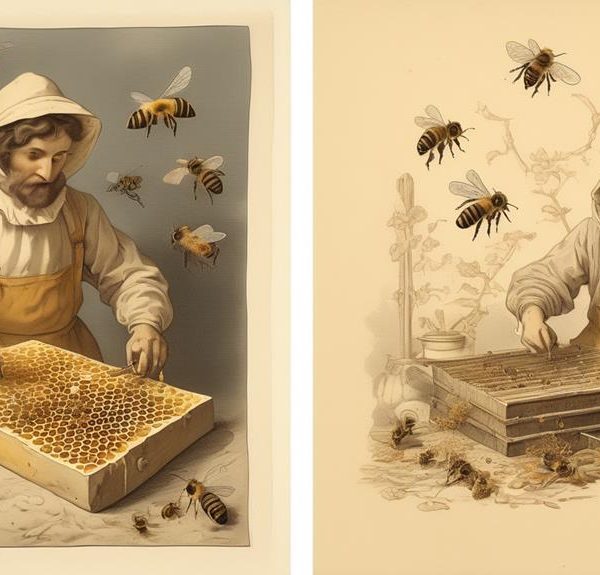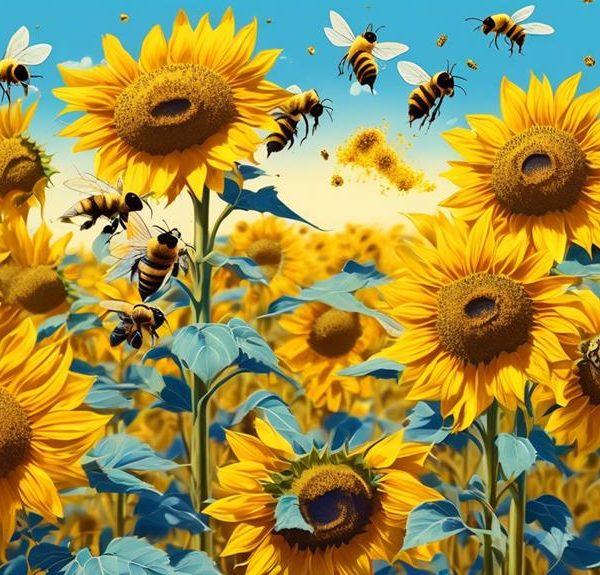Keeping bees healthy and mite-free: uncover the truth behind feeding bees while using Apivar.
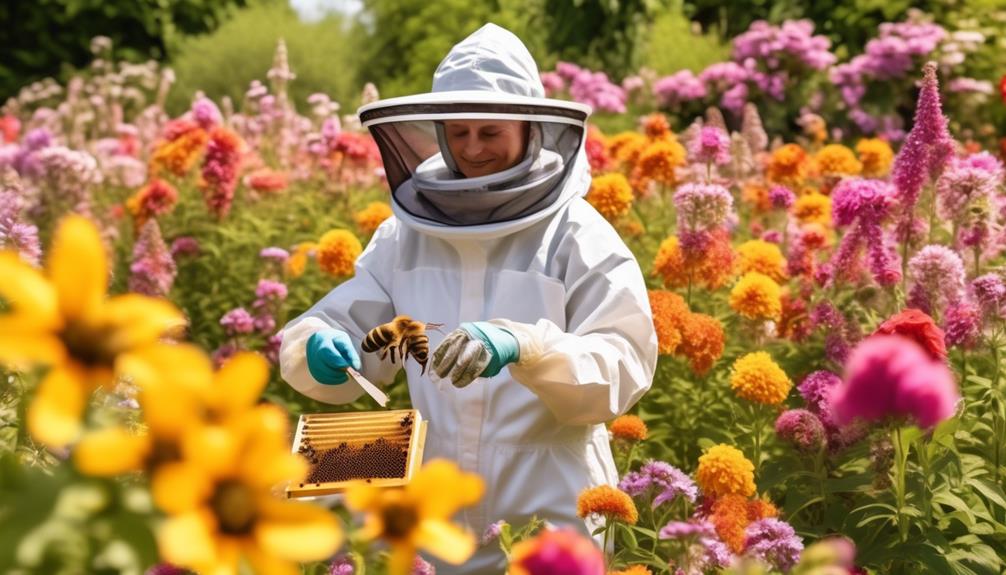
Can You Feed Bees While Using Apivar?
Is it really safe to feed your bees while treating them with Apivar?
This is a question that's been buzzing around in the beekeeping community for some time.
As a beekeeper, you are well aware that Apivar is an essential tool in your arsenal for controlling Varroa mite populations.
But, you also know that maintaining proper nutrition for your hive is equally crucial.
Do these two necessities conflict with each other?
Can you truly provide necessary sustenance to your hive while also administering this common miticide?
As we explore the intersecting dynamics of bee health, mite control, and the role of Apivar, you'll discover a wealth of insights to guide your beekeeping practices.
Key Takeaways
- Apivar is an essential tool for controlling Varroa mite populations, which weaken bees by sucking their blood and transmitting viruses.
- Bees need a balanced diet to stay healthy, and feeding them is necessary when natural food sources are scarce, especially during winter or drought.
- Apivar treatment may decrease bees' appetite and behavior changes may occur, so supplementing their diet with additional nourishment is recommended.
- Concurrent feeding during Apivar treatment can boost bees' health and productivity, but overfeeding should be avoided, and monitoring bees closely is important.
Understanding Apivar's Role
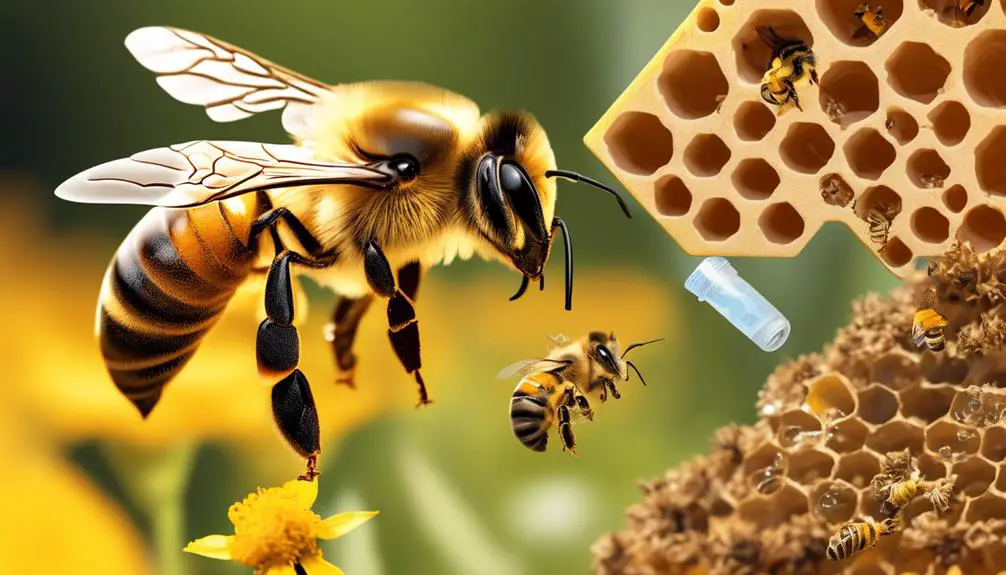
To truly comprehend the importance of Apivar in beekeeping, you need to understand its role in protecting your hive from Varroa mites, a prevalent parasite that can significantly harm or even destroy your bee colonies. Apivar's active ingredient, amitraz, works effectively to eliminate these parasites, safeguarding your bees' health and productivity.
Imagine a scenario where your beehive is infested with Varroa mites. These pests weaken your bees by sucking their blood and transmitting viruses, leading to a colony collapse if left unchecked. That's where Apivar steps in. You insert the Apivar strips into the hive, and as the bees move around, they come into contact with the strip, distributing the amitraz across the colony. This method ensures that all Varroa mites, even those hidden in brood cells, are effectively targeted.
However, it's crucial to remember that while Apivar is a powerful mite control tool, it's not a magic bullet. You must regularly monitor your hive's mite levels and use Apivar judiciously, especially during honey flow season, to avoid any potential residues in your honey. Proper usage of Apivar, along with a balanced diet, can ensure a healthier colony.
Feeding Bees: The Basics
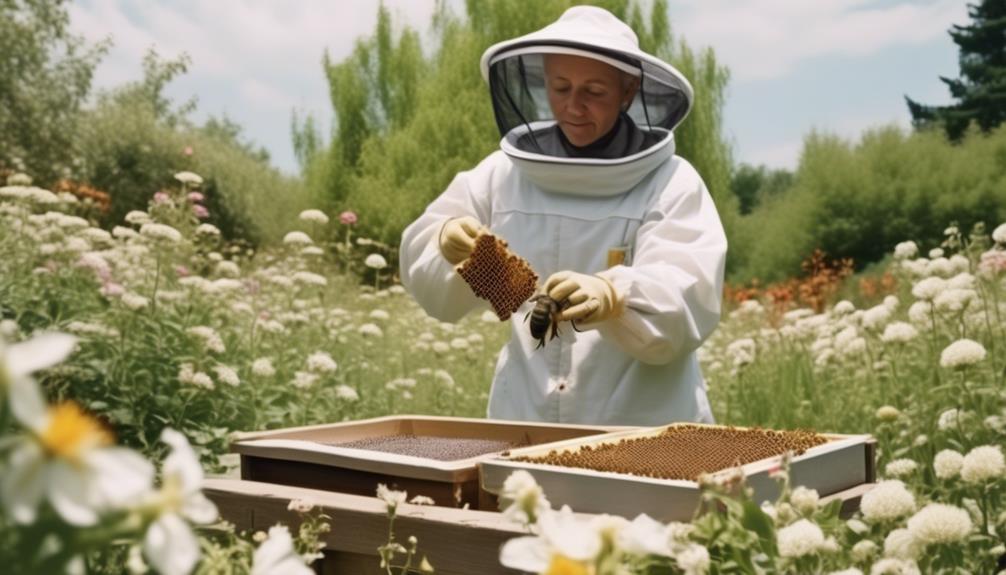
Just like humans, bees need a balanced diet to stay healthy, and as a beekeeper, it's your job to ensure they're getting the right nutrients, particularly when natural food sources are scarce. Feeding bees is a significant part of beekeeping, often required during seasons when nectar and pollen aren't abundantly available.
Typically, bees collect nectar and pollen from flowers. Nectar, which they convert into honey, provides carbohydrates, while pollen offers proteins, fats, and vitamins. However, during winter or drought, these resources can be limited. That's when you'll need to step in, providing a substitute food source.
You've got two main choices for feeding bees: sugar syrup and pollen substitute. Sugar syrup, made by dissolving sugar in warm water, mimics nectar. Pollen substitutes, on the other hand, are commercially available mixtures made to imitate pollen's nutritional composition.
Impact of Apivar on Bee Nutrition
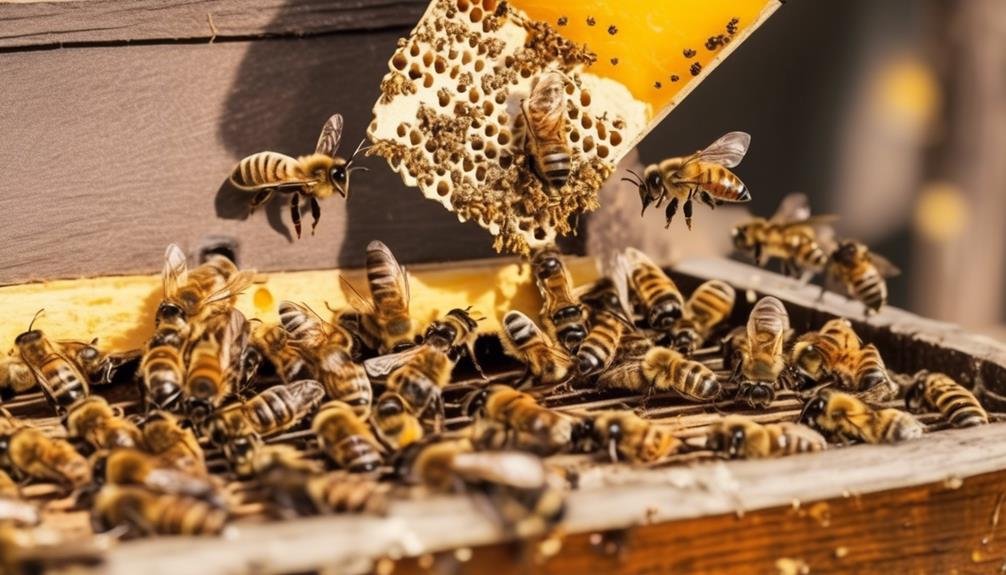
While ensuring your bees have access to adequate nutrition through sugar syrup and pollen substitutes, it's equally important to consider the impact of treatments like Apivar on their dietary health. As a pesticide, Apivar is used to combat Varroa mites, a common pest in beekeeping. However, it's essential to understand its effects on your bees' nutritional intake.
Apivar strips are typically applied during the bees' active season. During this time, your bees are consuming the most food, so it's vital to monitor their diet closely. Though Apivar's primary function isn't to interfere with bees' food consumption, it's been noted that some bees might exhibit decreased appetite after treatment.
This decrease could potentially result in weaker, less productive colonies. To counteract this, it's recommended to supplement your bees' diet with additional nourishment during Apivar treatment. Regularly check your hives, and if you notice any behavior change, take immediate action.
Bear in mind, Apivar is only a temporary solution to mite infestations. Always prioritize maintaining a balanced diet for your bees. Remember, a well-nourished hive is a healthy hive. Therefore, while using Apivar, ensure that your bees are getting all the nutrients they need to stay strong and productive.
Expert Opinions on Concurrent Feeding
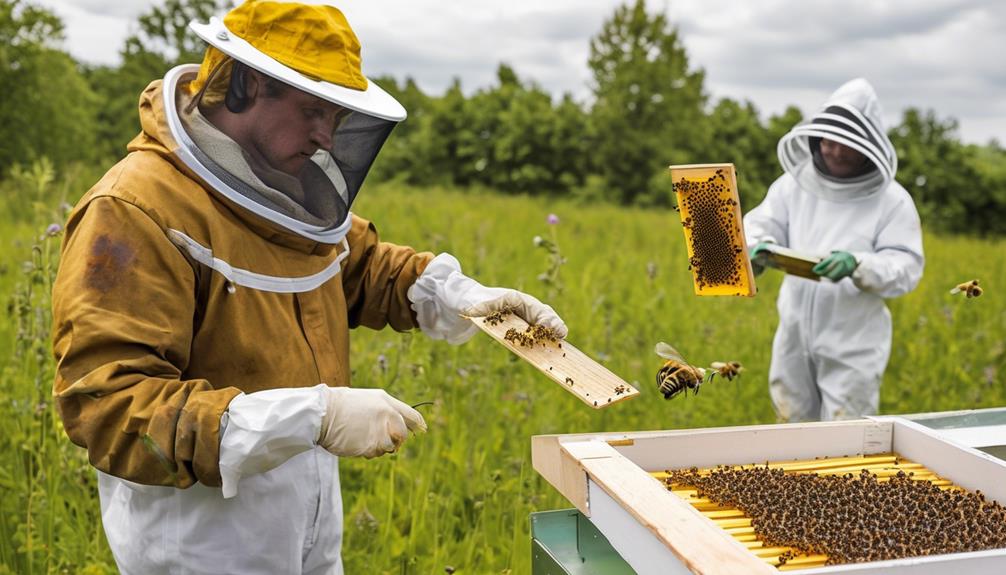
Leading apiarists argue that concurrent feeding during Apivar treatment can significantly boost your bees' health and productivity. They believe that the supplemental feeding can help bees recover from the stress of Apivar application, which often leaves them weakened. It's thought that the nutrients provided by the additional feeding can strengthen the bees, enabling them to fight off varroa mites more effectively, even when exposed to Apivar.
Experts recommend using a balanced blend of sugar and water, or specialized bee feed, to provide the extra nourishment. Be careful not to overfeed, which can lead to other health issues. Monitor your bees closely and adjust the feeding based on their consumption and behavior.
However, remember that while feeding can assist, it's not a standalone solution to varroa mite infestation. It should be used alongside Apivar for maximum results. Experts also stress the importance of adhering to the recommended dosage and application guidelines for Apivar. Any deviations can potentially harm your bees.
Making Informed Beekeeping Decisions
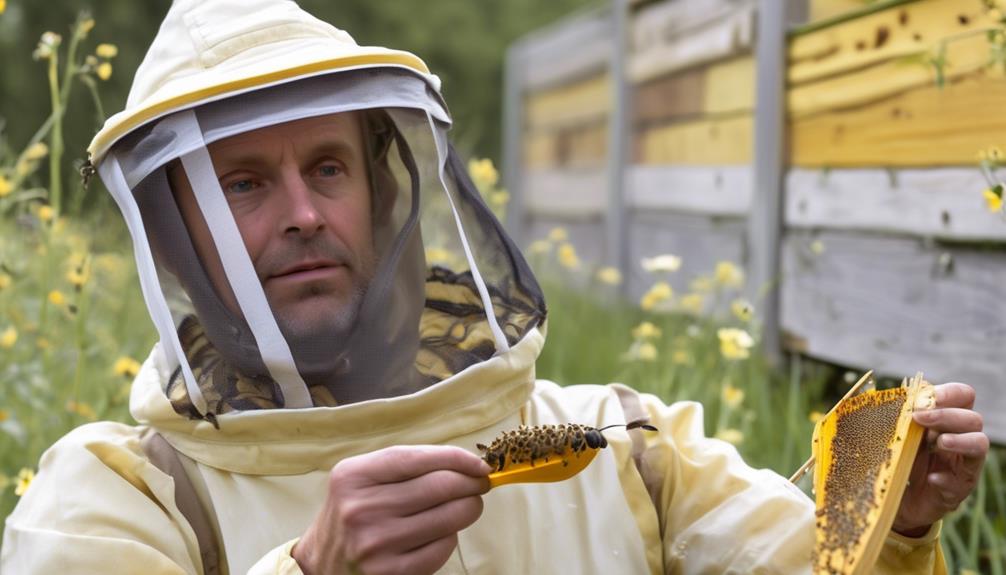
As a beekeeper, you've got the power to make decisions that directly impact your hive's health and productivity, and understanding the nuances of Apivar usage and supplemental feeding is a crucial part of that. You need to be well-informed about the potential effects of different treatments and feeding schedules on your bees.
It's not enough to just read up on Apivar. You've got to dig deeper. Learn about how it interacts with your bees' biology, and how it can affect their behavior and health. Can it harm your bees if used incorrectly? What're the signs of overuse? Does it interact negatively with certain types of feed? These are all critical questions you need to answer before making a decision.
Simultaneously, understand the importance of feeding. Starvation is a major cause of bee losses, especially during winter. You need to ensure they've enough food to survive, but also consider the type of feed you're providing. Is it nutritionally balanced? Does it contain any harmful substances?
Decisions like these aren't easy to make, but they're a vital part of responsible beekeeping. So, educate yourself, seek advice from experienced beekeepers, and always think critically about what's best for your hive.
Frequently Asked Questions
What Are the Potential Risks or Side Effects of Using Apivar for Bees?
Yes, you can.
However, there could be risks.
Apivar, if improperly used, can lead to mite resistance and potential harm to your bees.
It's essential to follow recommended dosages and treatment times to ensure the product's effectiveness and the health of your bees.
Always keep a close eye on your bee population during treatment.
Improper usage might cause a decrease in bee populations or even colony collapse.
Are There Any Specific Types of Food That Should Be Avoided When Feeding Bees?
Yes, there are certain foods you should avoid when feeding bees. Don't give them any food with preservatives, as these can be harmful. Avoid feeding bees honey from an unknown source, as it may contain spores of a disease that could infect your hive.
Also, don't use artificial sweeteners as bees can't digest them. It's best to feed them sugar water, or better yet, let them gather their own nectar when possible.
Can Apivar Use Interfere With the Natural Foraging Behavior of Bees?
Yes, you can feed bees while using Apivar. It's a common practice among beekeepers. Apivar is designed to control parasitic mites in beehives and doesn't interfere with a bee's natural foraging behavior or its ability to consume food.
However, it's important to follow the manufacturer's instructions when using any pesticide to ensure the health and safety of your bees.
Always remember, a well-fed bee is a healthy and productive bee.
What Are Alternative Treatments to Apivar for Controlling Varroa Mites in Bee Colonies?
You're looking for alternatives to Apivar for varroa mite control in bees.
There are several options available:
- Oxalic acid can be applied as a drip or vapor.
- Formic acid is found in Mite Away Quick Strips.
- Thymol-based treatments, such as Apiguard, are also effective.
In addition to these chemical treatments, there are non-chemical methods that can be used:
- Drone brood removal involves regularly removing drone brood, which is where varroa mites tend to reproduce.
- Powdered sugar dusting is another method that can help control mite populations.
How Does the Use of Apivar Affect the Honey Produced by the Bees?
When you use Apivar, it doesn't directly affect the honey produced by bees. However, it's crucial to remove it before honey flow to avoid any potential contamination. Apivar is designed to target mites specifically, not bees or their honey.
Always follow instructions and use it responsibly to ensure your bees' health and the purity of their honey. Nonetheless, be alert for any changes in your bees or their honey as a result of using Apivar.
Conclusion
In summary, you can indeed feed your bees while using Apivar. This miticide doesn't interfere with bee nutrition, but remember, it's not a substitute for proper feeding.
Experts agree there's no harm in concurrent feeding. As a responsible beekeeper, keep informed about best practices and always consider the health of your hive first.
Balancing pest control with optimal nutrition is key to maintaining your buzzing community.

